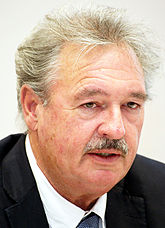Juncker–Asselborn II Government

Juncker–Asselborn Ministry II was the government of Luxembourg between 23 July 2009 and 11 July 2013. It was led by, and named after, Prime Minister Jean-Claude Juncker and Deputy Prime Minister Jean Asselborn. It was formed on 23 July 2009, after the 2009 election to the Chamber of Deputies. It fell after the withdrawal of the Luxembourg Socialist Workers' Party from the government; Prime Minister Juncker submitted his resignation to the Grand Duke on 11 July 2013, and a snap election was called.
Ministers


| Name | Party | Office | |
|---|---|---|---|
| style="background-color: Template:Christian Social People's Party/meta/color" | | Jean-Claude Juncker | CSV | Prime Minister Minister for the Treasury |
| style="background-color: Template:Luxembourg Socialist Workers' Party/meta/color" | | Jean Asselborn | LSAP | Deputy Prime Minister Minister for Foreign Affairs |
| style="background-color: Template:Christian Social People's Party/meta/color" | | Marie-Josée Jacobs | CSV | Minister for the Family and Integration Minister for Cooperation and Humanitarian Action |
| style="background-color: Template:Luxembourg Socialist Workers' Party/meta/color" | | Mady Delvaux-Stehres | LSAP | Minister for National Education and Vocational Training |
| style="background-color: Template:Christian Social People's Party/meta/color" | | Luc Frieden | CSV | Minister for Finances |
| style="background-color: Template:Christian Social People's Party/meta/color" | | François Biltgen | CSV | Minister for Justice Minister for the Civil Service and Administrative Reform Minister for Higher Education and Research Minister for Communications and the Media Minister for Religion |
| style="background-color: Template:Luxembourg Socialist Workers' Party/meta/color" | | Jeannot Krecké until 1 February 2012 |
LSAP | Minister for the Economy and Foreign Trade |
| style="background-color: Template:Luxembourg Socialist Workers' Party/meta/color" | | Mars Di Bartolomeo | LSAP | Minister for Health Minister for Social Security |
| style="background-color: Template:Christian Social People's Party/meta/color" | | Jean-Marie Halsdorf | CSV | Minister for the Interior and Grand Region of Luxembourg Minister for Defence |
| style="background-color: Template:Christian Social People's Party/meta/color" | | Claude Wiseler | CSV | Minister for Sustainable Development and Infrastructure |
| style="background-color: Template:Luxembourg Socialist Workers' Party/meta/color" | | Nicolas Schmit | LSAP | Minister for Labour, Employment and Immigration |
| style="background-color: Template:Christian Social People's Party/meta/color" | | Octavie Modert | CSV | Minister for Culture Minister for Relations with Parliament Minister for Administrative Simplification under the Prime Minister Minister-Delegate for the Civil Service and Administrative Reform |
| style="background-color: Template:Christian Social People's Party/meta/color" | | Marco Schank | CSV | Minister for Housing Minister-Delegate for Sustainable Development and Infrastructure |
| style="background-color: Template:Christian Social People's Party/meta/color" | | Françoise Hetto-Gaasch | CSV | Minister for the Middle Class and Tourism Minister for Equality of Opportunity |
| style="background-color: Template:Luxembourg Socialist Workers' Party/meta/color" | | Romain Schneider | LSAP | Minister for Agriculture, Viticulture, and Rural Development Minister for Sport Minister-Delegate for Economic Solidarity |
| Source: Service Information et Presse | |||
Formation
The Christian Social People's Party (CSV) emerged the winner of the election of 7 June 2009. It received 38,04 % of the votes and 26 seats. Its coalition partner, the Luxembourg Socialist Workers' Party (LSAP), lost one seat and was left with 13 members in the new Chamber of Deputies. It remained however the second-strongest party in terms of seats. The Democratic Party, which had already experienced loses at the previous elections in 2004, was left with only 9 seats, (down from 10 in 2004 and 15 in 1999). The Greens repeated their positive results from 2004 and received 7 seats. The ADR, which in April 2006 had changed its name from Aktiounskomitee fir Demokratie a Rentegerechtegkeet to Alternativ Demokratesch Reformpartei, did not managed to increase its voter base and only received 4 seats (5 in 2004). On the other hand, the Left, having been absent from the parliament in 2004-2009, was again represented by one Deputy. The two other parties registered at the elections, the Communist Party and the "Citizens' List" (Biergerlëscht), received no seats. After the elections, the CSV started coalition talks with the LSAP to form a "government of continuity and responsibility". The coalition agreement was signed on 20 July and three days later the new government was sworn in at Berg Castle.
See also
References
- Thewes, Guy (2011). Les gouvernements du Grand-Duché de Luxembourg depuis 1848 (PDF) (in French). Service Information et Presse. ISBN 978-2-87999-212-9.
